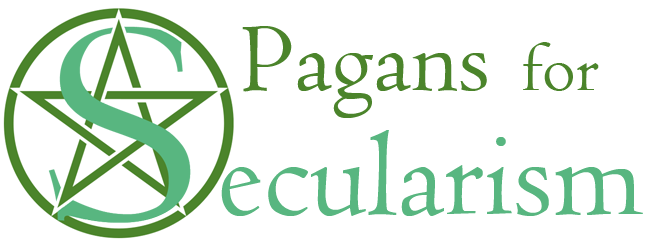In addition to Paganism and Shinto, a major passion of mine is secularism.
What’s secularism, I hear you ask. Is that the same as Atheism or Humanism? Not at all! Atheism and Humanism are philosophies, which (in most cases) are based on the belief that there are no gods of any sort.
Secularism is not so much a philosophy as it is a political concept. It’s a fairly simple idea: that religion should be kept separate from state, and that all people of all religions and none should be treated equally, without anyone from any particular religion or belief being advantaged or disadvantaged in society. Some countries, like the US, France and Japan, are constitutionally secular. For a more detailed overview of secularism, you can check out this Secularist Charter by the National Secular Society, and this video by Humanists UK.
Although Atheists and Humanists are often the dominant spokespeople for secularism, you do not need to be non-religious to be a secularist or benefit from secularism. Provided you believe that religion is a matter of individual choice that should not be imposed on other people, you’ll probably find your beliefs are more or less secularist.
That’s why there are religious groups that support secularism, such as the Christian think-tank Ekklesia and the Muslim group British Muslims For Secular Democracy. And that’s also why I felt it was high time for some sort of group for Pagan secularists, which is why I recently set up the Facebook group, Pagans for Secularism.
The aims of Pagans for Secularism are as follows:
- To broaden the secularist discussion outside Atheist and Humanist circles. It is true that Atheists and Humanists have historically been the biggest supporters of secularism, often because they’ve found themselves to be some of the most marginalised and persecuted people in countries that are very non-secular (i.e. theocracies). But now we need to hear more voices of support from religious and spiritual people too, and we need to spread awareness of what secularism means among people of faith. It’s very important to emphasise that secularism means freedom of religion, as well as freedom from religion. It means, for example, that Christians cannot persecute Pagans, or vice versa. Secularists believe that freedom of religion should only be restricted when it impinges on the rights of others.
- To give like-minded Pagans a place to meet and discuss. Although secularist Atheists and secularist Pagans may have plenty in common, one thing they will disagree about is, naturally, personal spiritual beliefs. You won’t generally find people in atheist groups talking about what they’re up to at the Full Moon, or wishing each other Imbolc Blessings, or discussing which deities they pray to when they seek guidance, in an atheist group. But these topics won’t be out of place at all in Pagans for Secularism.
On the flip side, there are also Pagans who are not secularists. Some Pagans believe that it’s fine for state affairs to be tied up with religion, or that religious people should be entitled to special privileges or exemptions from laws that are not given to people outside the religion. This group gives the Pagans who disagree with this view a place where they can build friendships and relationships based on a common cause.
But Pagans for Secularism is also a place for members to discuss points of disagreement as well as agreement. There are many issues where even secularists don’t agree, so discussion is vital to ensure a wide variety of views are reflected in secularist discourse.
Of course, Atheists, Humanists and all other non-Pagans of all religions and none are welcome to join too! All you need to join is an interest in secularism and Paganism. - To focus on secularist issues affecting Pagans in particular. While all sorts of secularist issues are discussed at Pagans for Secularism, we do tend to focus more on the ones likely to affect Pagans in particular. This may include discriminatory faith schools, school children from Pagan families being forced into Christian worship, and specific cases where Pagans are victimised. Although recognition of Paganism is growing as Pagans increase in number and visibility, many of us still encounter disadvantages that people from other religions do not.
We also focus on other issues that Pagans might find themselves particularly sympathetic towards. For example, “witchcraft” persecution in countries where it is still a crime to be practising (or thought to be practising) magic, or issues of indigenous cultures having their own beliefs supplanted by other religions, issues relating to the environment or animal welfare, or issues to do with gender and LGBT equality. - To focus on secularist issues within the Pagan community. It’s important to remember that Pagans aren’t just victims of religious injustice. Sometimes Pagans themselves commit acts that threaten or contradict secularist principles either in the name of their religion, or facilitated by their religion. These may include: using Pagan practice as an opportunity to abuse vulnerable people; promoting hateful and/or extremist ideologies such as white supremacy and Neo-Nazism; curtailing others people’s right to free expression by trying to censor particular portrayals of Pagans, witches or aspects of Paganism; or collecting animals or plants by illegal means for use in magic. I think it’s important for us Pagans not to simply try to dismiss these issues by saying things like, “well, such a person can’t be a real Pagan”, but rather to condemn them, confront them and discuss how we can tackle these problems.
- To campaign and make a difference! People acting in groups are usually much more powerful than people acting alone, and having a group of like-minded, passionate people gives us the opportunity to effectively fight for secularist justice. That’s why you’ll find petitions and other calls to action being shared at Pagans for Secularism. We’re a very small, new group but we’ve already had some small successes, one being highlighting the issue of Facebook censoring pictures of children on a story about forced conversion of tribal people.
Pagans for Secularism so far only exists as a Closed Facebook group. We keep it Closed in order to give a greater level of protection to our members – it’s still the case that talking about Paganism and secularism is dangerous in many countries. So the only way we can really promote it is through word-of-mouth. So if you are interested in both Paganism and secularism, please do sign up!

















